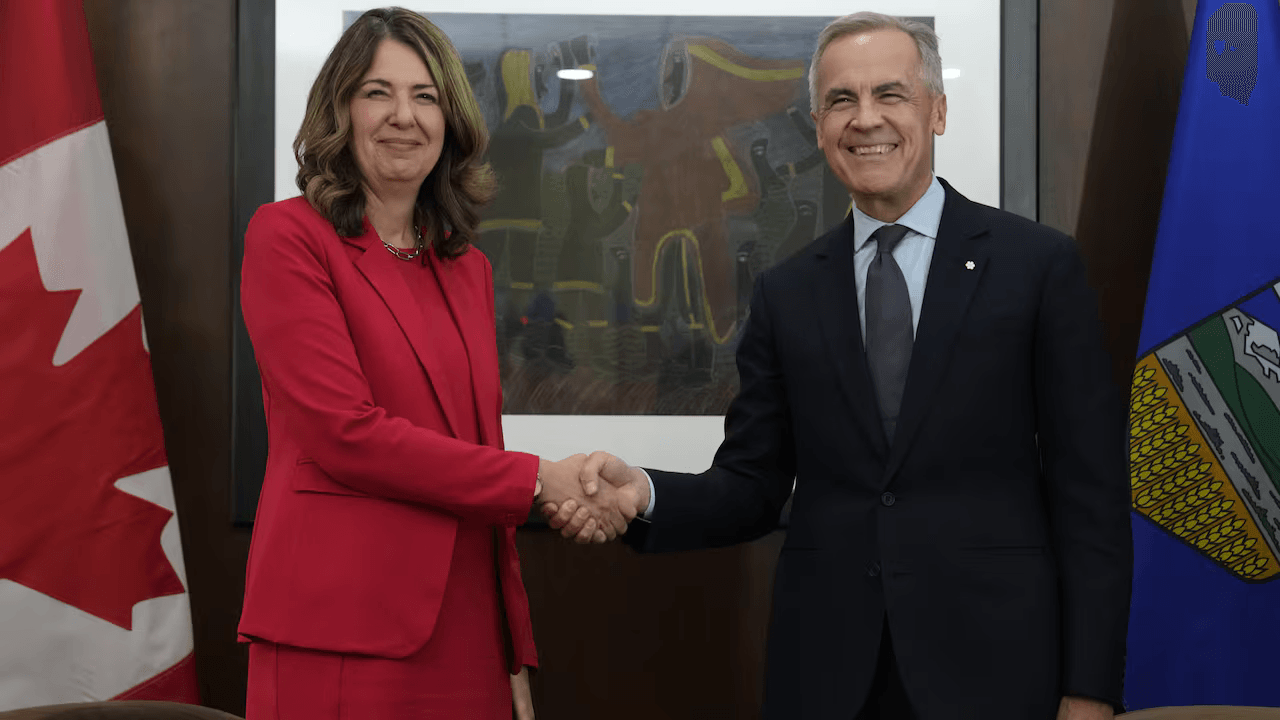Pipeline Talks Ongoing: Carney and Smith Near Deal Amid Fierce Opposition
Edmonton Scoop
Archives
Pipeline Talks Ongoing: Carney and Smith Near Deal Amid Fierce Opposition
SIGN UP FOR OUR NEWSLETTER
A Deal on the Horizon: Inside the High-Stakes Pipeline Talks Between Carney and Smith |
Confidential negotiations for a new oil pipeline to the B.C. coast are nearing a critical stage, reviving old wounds and sparking a fierce political battle with British Columbia and First Nations leaders. |
Image source: Cbc news |
The whispers in Ottawa and Calgary have grown into a deafening roar.
Prime Minister Mark Carney and Alberta Premier Danielle Smith are reportedly on the cusp of a landmark agreement, a Memorandum of Understanding that could pave the way for a new oil pipeline to British Columbia's northern coast.
These are more than just discussions; they represent a potential seismic shift in Canadian energy policy.
Sources close to the negotiations describe the Pipeline Talks Ongoing as intense but constructive, aimed at what Premier Smith has called a "grand bargain."
The goal is to finally secure tidewater access for Alberta’s landlocked oil, a dream that has fueled political battles for over a decade.
This nation-building project would stretch from the heart of Alberta's oil sands to a deep-water port in either Kitimat or Prince Rupert, opening up lucrative Asian markets.
For Alberta, it's a once-in-a-generation opportunity to unlock the province's resource wealth and reduce its economic dependence on the United States.
Premier Smith has been passionately championing the project, framing it as essential for both provincial and national prosperity.
The provincial government has even taken the unprecedented step of acting as the project's proponent, committing millions in public funds for initial planning.
However, this emerging deal is casting a long and familiar shadow over the West Coast.
The entire proposal is a haunting echo of a battle fought and won not so long ago.
The Ghost of Northern Gateway
One cannot understand the current firestorm without revisiting the history of the failed Northern Gateway Pipeline.
Proposed by Enbridge, that project followed a nearly identical route and promised similar economic windfalls.
But it ignited a movement.
For years, it was met with unrelenting opposition from a powerful coalition of First Nations, environmental groups, and concerned British Columbians.
They warned of the catastrophic risk of a tanker spill in the treacherous waters of the Douglas Channel and the Great Bear Rainforest.
Ultimately, the Trudeau government rejected the project in 2016, citing a failure to adequately consult with Indigenous communities and enacting a moratorium on large oil tanker traffic along B.C.'s northern coast.
That tanker ban remains the single largest obstacle to the Carney-Smith plan.
For this new pipeline to become a reality, that federal ban would need to be amended or completely overturned.
It’s a move that opponents see as a profound betrayal and an unacceptable risk.
British Columbia's Furious Rebuke
Left out of the initial high-level talks, B.C. Premier David Eby has responded with fury.
He blasted the negotiations as "secret conversations" that trample on his province's jurisdiction and environmental concerns.
"I almost fell out of my seat," Eby stated, expressing shock that major decisions about British Columbia's coastline were being made without his government at the table.
Eby argues the project is reckless economic folly, pointing to the recently completed Trans Mountain pipeline expansion to Burnaby.
That taxpayer-funded project, he notes, isn't even operating at full capacity yet.
He insists that optimizing the existing Trans Mountain system is a far cheaper and safer way to increase export capacity than building a brand-new pipeline through a pristine and challenging landscape.
His opposition is not just political posturing; it reflects a deep-seated public sentiment in B.C. that the environmental risk is simply not worth the reward.
A Line Drawn on the Coast
The most powerful opposition, however, comes from the Indigenous communities whose territories the pipeline and tankers would cross.
Coastal First Nations have declared they are "incredibly alarmed" by the talks.
For them, the oil tanker ban is the sacred foundation of environmental and economic security in the region.
They have made it unequivocally clear: their consent is required, and it will not be given.
While Alberta's government suggests some inland First Nations are open to discussing equity partnerships, the coastal nations who fought the Northern Gateway battle are resolute.
They vow to use every tool at their disposal to stop the project.
This isn't just about consultation anymore; the legal and political landscape has shifted to require meaningful consent.
The Political Endgame
For Prime Minister Mark Carney, the situation is a high-wire act.
His government is eager to fast-track "nation-building projects" and demonstrate a commitment to the country's energy sector.
Securing a deal with a frequently adversarial Alberta government would be a significant political achievement.
It is believed that federal support for the pipeline is being leveraged to gain Alberta’s acceptance of national climate policies, such as the industrial carbon price.
But the political cost could be immense.
Proceeding would mean alienating a provincial government, inflaming tensions with Indigenous peoples, and mobilizing environmental activists across the country.
As the details of a potential Memorandum of Understanding begin to leak, one thing is certain.
An agreement on paper is merely the beginning.
The Pipeline Talks Ongoing will soon move from the quiet corridors of power to the rugged coastline of British Columbia, where the real battle will be fought.
The debate over Canada's energy future is about to be reignited, with all the passion, division, and high stakes of the past.
Our reader's questions: Understanding the Pipeline Proposal
What is the proposed Alberta to B.C. pipeline?
It is a proposed project to transport crude oil from Alberta's oil sands to a port on the northern coast of British Columbia, likely Kitimat or Prince Rupert. The project is currently the subject of high-level negotiations between the federal government and the Alberta government, but does not yet have a private sector proponent.
Why is the B.C. oil tanker ban so important?
Enacted after the Northern Gateway pipeline was rejected, the federal ban prohibits oil tankers carrying more than 12,500 metric tons of crude oil from docking at ports along B.C.'s northern coast. Coastal First Nations and environmental groups consider it essential for protecting the ecologically sensitive Great Bear Rainforest and marine ecosystems from a potential spill.
What happened to the Northern Gateway pipeline?
The Northern Gateway project, a similar pipeline proposal, was rejected by the federal government in 2016. The decision followed years of intense opposition and a Federal Court of Appeal ruling that found the government had failed in its duty to consult with affected First Nations communities. |


